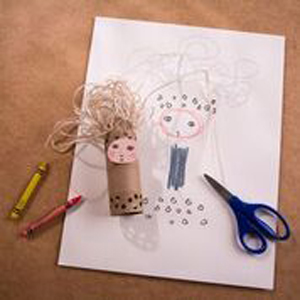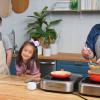
Photo:
Credit for all images in this article: Kathleen Miller
Does your family have cabin fever? Are all your Zoom meetings interrupted by your kids declaring they are bored, again?
We hear you and we're here to help with some fun craft projects using stuff you probably already have around the house. Whether you have a whiney toddler, bored tween or a grumpy teen, we have some great craft projects to engage them all.
1. Toddler dance party egg shakers
Ginny Bearson, a retired Redmond Toddler Group teacher, offers a fun DIY percussion instrument craft that you can do with toddlers and younger children.
Supplies: Plastic Easter eggs or empty plastic water bottles with lids. Rice, popcorn seeds, dried beans, gravel or dried peas. Glue, packing tape or duct tape.
Instructions: Fill an empty dry water bottle or one half of the plastic egg with choice of material together. Glue or tape the egg shut and put the lid back on the bottle. Vary material and containers to create a range of sounds. When dry, enjoy a lockdown dance party.
 2. Paper towel tie-dye art
2. Paper towel tie-dye art
Make art indoors or outdoors with this fun activity from Bearson.
Supplies: Food coloring, a muffin tin and paper towels.
Instructions: Fill several sections of a muffin tin with water and color each with a different color of food coloring (if you don’t have food coloring, try mixing a piece of dried watercolor paint with water). Fold a square of paper towel over several times, until it is a small square. Let your child dip each corner into a different color. Unfold to see tie-dye pattern, let dry. Mount to a dark piece of construction paper.
3. Fun with homemade playdough
Seattle Occupational Therapy student, Meredith Peterson, recommends this great activity for kids of all abilities. Make some playdough together and then hide objects in it to find, or create imaginary worlds together with playdough and objects on wax paper or foil.
Here is a great recipe to make your own playdough from the Fun Learning For Kids website that doesn’t involve cream of tartar — an ingredient families may not have on hand right now.

4. Dye Easter eggs with colors from nature
If your family loves to dye Easter eggs but you didn’t purchase dye this year, fear not. You can make dye colors from nature. And you can also use the dye for other fun projects including paper towel tie-dye.
Supplies: Hardboiled eggs, white vinegar, 1 cup shredded beets per cup of water (pink), 1 cup chopped purple cabbage per cup of water (blue), 2 tablespoons ground turmeric per cup of water (yellow), 1 cup onion skins per cup of water (orange). You can also experiment with loose teas to make interesting colors. Strainer. Pot. Bowl. White plate. Baking dish.
Instructions: Start by making a batch of the colors you want. Boil water and add one ingredient (e.g. shredded beets to make pink), turn the water down to simmer then cover and cook for about 20 minutes. Take a sample of the dye and drop it on a white plate. Simmer longer if the color isn’t vibrant enough. When done, turn off the heat, pour the liquid through a strainer. Stir one tablespoon of white vinegar into each cup of dye to stabilize it. Place hardboiled eggs in a baking dish and pour the cooled dye over them until completely covered. Place in refrigerator. Remove when the color is the vibrancy you prefer. Carefully dry each egg and place it back in the refrigerator until it is time to eat them.

5. Make your own journal (for tweens or teens)
Artist and author Dawn Sokol offers a great DIY journal that can be made from materials you have around the house. Find this and more great projects and online classes on her website.
Supplies: Cereal box, or large food or product box (no corrugated cardboard). Various papers to fit inside such as paper grocery bags, large or small envelopes, etc. Sewing needle and thread, such as waxed linen thread, embroidery thread, baker’s twine, sewing thread, or thin hemp or twine or even dental floss. Awl or small scissors with sharp points. Bull clips or large paper clips or even a chip bag clip or clothespins. Pencil. Duct tape or masking tape.
Instructions: Easy to follow free online instructions here.
 6. Create your own crayon blocks
6. Create your own crayon blocks
This is a great project to do with your kids that will magically transform all those broken crayons they no longer use into something new and fabulous.
Supplies: Old crayons — remove all paper wrappers. Muffin tin. Shortening, butter or cooking spray.
Instructions: Break the crayons into small pieces and mix up together. Lightly grease each individual cup of a muffin tin. Preheat oven to 150 degrees. Put the tin in the oven for 20 minutes or until the wax completely melts. Let muffin tin cool then place in the freezer for about an hour. Take it out then you can gently remove the new crayon blocks out. Wipe off any remaining grease.
7. French fold book
This classic book form is a magic trick that only requires paper and scissors. Older kids can sew several signatures together with a pamphlet stitch and add a cover from cardboard to make a studier, bigger book and younger kids can also make the book with “kid scissors”. This is also a great project to make together to create a book of drawings to mail to grandparents.

Instructions: Hold the paper horizontally then fold it upwards, like a hot dog bun. Turn the paper vertically with the fold on the right-hand side. Now fold down, like a hamburger bun. Fold down one more time, again like a hamburger bun. Unfold. Hold the paper vertically. Fold down once. You should now have a tent. Crease the fold at the top. Flip the tent up in your hand so the fold is now at the bottom. Now carefully, cut up from the fold to where the fold lines make an intersection and stop! Now push the folds together to make pages. Here are free easy to follow online directions and a project idea on Lauren Stringer’s website.
 8. Art Studio in a can
8. Art Studio in a can
Kids are more likely to engage in art if they have supplies together in one place. My art students make mobile art studios out of Trader Joe's coffee cans. They're easy to create, then you can encourage kids to go into the backyard and find something to draw, perhaps in their French fold books.
Supplies: Trader Joe's coffee cans work great but any can with a lid will work. Duct tape, scissors, glue stick, black sharpie pen, stickers, paint, paper, yarn, twine, fabric. Pens, pencils, crayons, markers – any “mark-making tools” you have lying around the house will do.
Instructions: Start by having your child write his or her name or initials in sharpie on the can’s plastic lid and bottom of the can. This step will save you any battles with siblings later. When I have my students make these in my art summer camps, I wash them out first, dry, then paint the cans with white gesso and let them dry. That creates a “canvas” for my students to paint or draw on. You don’t need to get that fancy. Kids can cover the can with paper — cut to size then glue or tape on. If you have duct tape or electrical tape, you can let your kids cover the entire can with that. They can tape or glue yarn or twine around the can too. Stickers also work great. When the can is done being decorated, fill it with colored pencils, markers or whatever art-making supplies your kids like. Now they can take their “art studio” anywhere, including into the back yard to draw. When you get to travel again, the can is a great boredom buster on long plane or car rides.
9. Design a new board game from a cardboard box
Cardboard boxes are magical. They can be transformed into play structures for hours of imaginative play, indoors or out. Kids can also create an imaginary village or create a new board game out of them.
Supplies: Cardboard box or boxes. Paint, markers, scissors, hobby knife (such as X-acto), duct tape, electrical tape or packing tape.
Instructions: if you are lucky, you have recently had an appliance or something else large delivered. If not, you can take smaller cardboard boxes, cut apart with a hobby knife (a job for a grown-up), flatten and tape together. Offer kids some mark-making tools; older kids could paint on the cardboard if they wish. They can use the cardboard to create a food truck, space rocket or store. Lay the cardboard flat and encourage kids to draw an imaginary place to play in — think Animal Crossing or Minecraft. Offer props for imaginary stores and restaurants and encourage kids to bring out favorite toys to play with in their newly created imaginary land. Tweens might enjoy inventing a new board game for the family to try and play together.
 10. Toilet paper roll play
10. Toilet paper roll play
Carla Sonheim, Seattle artist, teacher and author, has wonderful online classes including free ones for kids on her website. Visit her website for a free printable Art Prompts PDF, a creative care package from 12 art teachers. Sonheim has created this delightful activity for kids with just a few supplies.
Supplies: Paper, toilet paper roll, tape or glue, yarn, pencil, hole punch, markers, shoebox (optional) and scissors.
Instructions: Take a toilet paper roll and create a character. Keep it fun, simple and fast. You can stick on yarn for hair with tape or glue, draw a face, make an outfit to glue or tape on from paper. Take a photo of your character in his or her natural habitat , wherever that might be. Or draw a portrait of your character however you like. No rules here, just use your toilet paper roll character as inspiration. For more fun, make several characters and perform a little play for the whole family.











